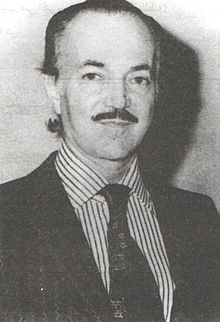Amir Khosrow Afshar
Amir Khosrow Afshar | |
|---|---|
 | |
| Minister of Foreign Affairs | |
| In office 27 August 1978 – 5 January 1979 | |
| Monarch | Mohammad Reza Pahlavi |
| Prime Minister | Jaafar Sharif Emami Gholam Reza Azhari |
| Preceded by | Abbas Ali Khalatbari |
| Succeeded by | Ahmad Mirfendereski |
| Personal details | |
| Born | 1919 Tehran, Qajar Iran |
| Died | 1999 (aged 79–80) |
| Nationality | Iranian |
Amir Khosrow Afshar (1919–1999; Persian: امیرخسرو افشار قاسملو) was an Iranian diplomat, who served as the minister of foreign affairs of Iran during the Shah era from 1978 to 1979.
Career[]
Born in 1919 in Tehran,[1][2] Afshar was a career diplomat. At the beginning of the 1950s he was the political joint secretary at the foreign ministry.[3] He later assumed the posts of the foreign ministry's permanent secretary and deputy foreign minister.[4][5] In 1960, he was the acting minister of foreign affairs.[6]
While serving as the deputy to Ardeshir Zahedi, Iranian foreign minister, Afshar was named as the chief Iranian negotiator on the Bahrain question in 1968.[7] Next, he was appointed ambassador of Iran to the Court of St. James's on 6 November 1969, succeeding Abbas Aram in the post.[8][9] He held this position until December 1974 and was replaced by Muhammad Reza Amir Teymour in the post.[10][11]
Afshar also served as the ambassador of Iran to West Germany and to France.[6] He was appointed foreign minister to the cabinet led by Jaafar Sharif Emami on 27 August 1978, replacing Abbas Ali Khalatbari in the post.[12] He retained the post when a military government led by Gholam Reza Azhari formed on 6 November 1978.[12][13] His term ended in 1979 and he was replaced by Ahmad Mirfendereski in the post.[2]
Afshar left Iran before the revolution and died in 1999.[1]
Honors[]
Afshar was the recipient of Honorary Knight Commander of the Most Distinguished Order of Saint Michael and Saint George.[11]
References[]
- ^ a b "خسرو افشار قاسملو". rasekhoon.net (in Persian).
- ^ a b "Foreign ministers E-K". Rulers. Retrieved 25 July 2013.
- ^ Hashem Hakimi (13 February 2002). "Fatemi's outburst". The Iranian. Retrieved 9 August 2013.
- ^ Roham Alvandi (2012). "Nixon, Kissinger, and the Shah: the origins of Iranian primacy in the Persian Gulf" (PDF). Diplomatic History. 36 (2): 337–372. doi:10.1111/j.1467-7709.2011.01025.x. Archived from the original (PDF) on 20 July 2013.
- ^ Thomas L. Hughes (22 April 1969). "Dispute Over the Shatt al-Arab Disturbs Relations Periodically" (Intelligence report). CIA. Retrieved 25 July 2013.
- ^ a b "Afshar-Ghassemlou, Amir-Khosrow". Harvard University. Archived from the original on 12 May 2014. Retrieved 26 July 2013.
- ^ Roham Alvandi (2010). "Muhammad Reza Pahlavi and the Bahrain Question, 1968–1970". British Journal of Middle Eastern Studies. 37 (2): 167. doi:10.1080/13530191003794723.
- ^ "State Intelligence". The London Gazette. 27 November 1969. Retrieved 7 August 2013.
- ^ John R. Hinnells (1975). Mithraic Studies: Proceedings of the First International Congress of Mithraic Studies. Manchester University Press. p. 518. ISBN 978-0-7190-0536-7.
- ^ "Libel damages for Iran's former ambassador". The Glasgow Herald. 11 May 1984. Retrieved 26 July 2013.
- ^ a b "State Intelligence" (PDF). London Gazette. 31 December 1974. Retrieved 6 August 2013.
- ^ a b "A chronology of the Iranian Revolution (1978-79)". Derkeiler. Archived from the original on 2 May 2014. Retrieved 25 July 2013.
- ^ Sepehr Zabir (27 April 2012). The Iranian Military in Revolution and War (RLE Iran D). Taylor & Francis. p. 27. ISBN 978-1-136-81270-5.
External links[]
 Media related to Amir Khosrow Afshar at Wikimedia Commons
Media related to Amir Khosrow Afshar at Wikimedia Commons
- 20th-century diplomats
- 20th-century Iranian politicians
- 1919 births
- 1999 deaths
- Ambassadors of Iran to Germany
- Ambassadors of Iran to France
- Ambassadors of Iran to the United Kingdom
- Foreign ministers of Iran
- Honorary Knights Commander of the Order of St Michael and St George
- Politicians from Tehran